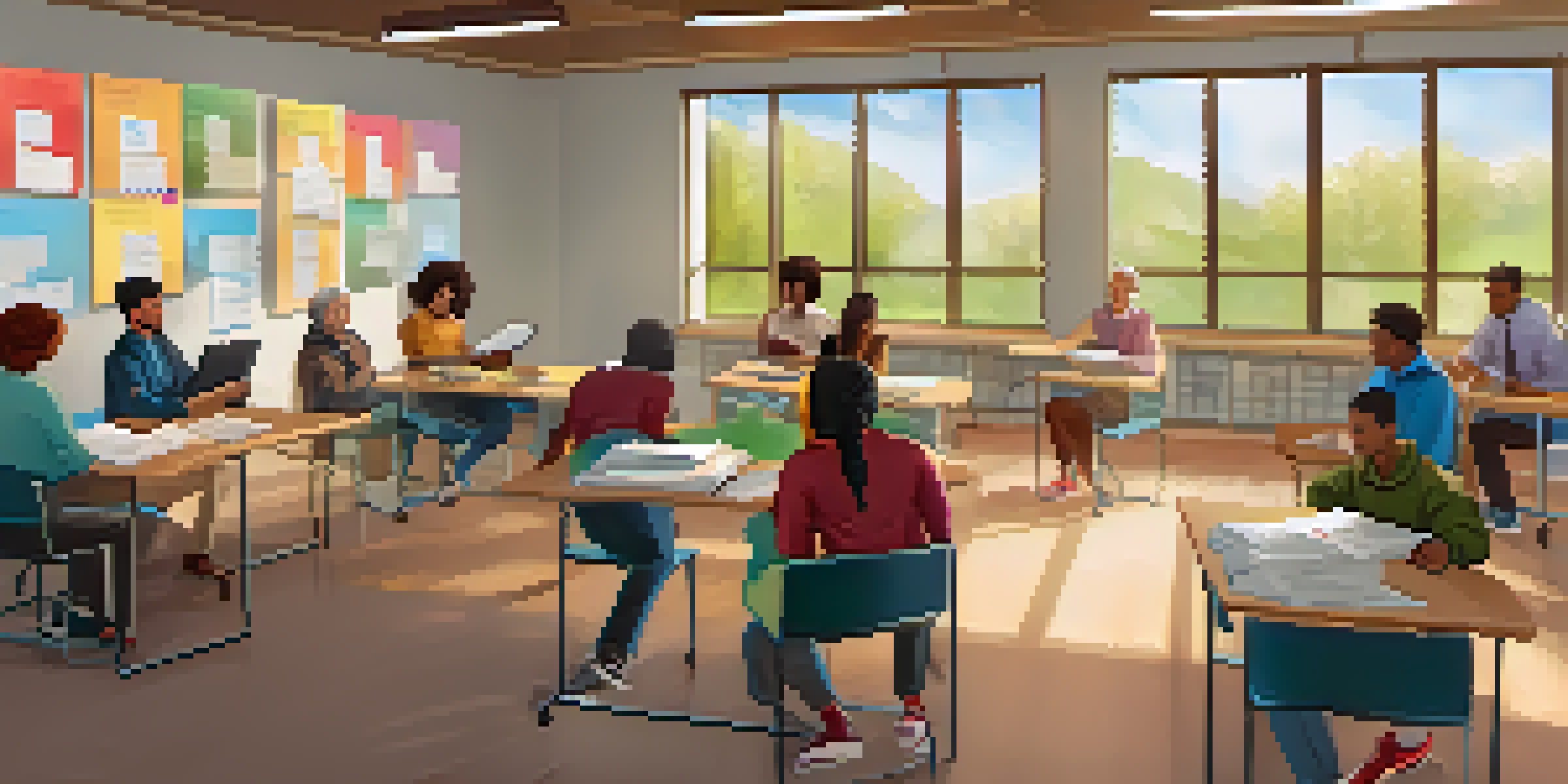Adaptive Learning for Adult Education: Tailoring the Approach

Understanding Adaptive Learning in Adult Education
Adaptive learning is an educational method that adjusts to the needs of individual learners. In adult education, this means recognizing that each learner comes with unique experiences and knowledge. By tailoring the learning experience, educators can enhance engagement and retention, making the process more effective and enjoyable.
Education is not the filling of a pail, but the lighting of a fire.
Imagine walking into a classroom where the instructor knows exactly what you struggled with last week and what skills you’ve mastered. This personalized approach not only boosts confidence but encourages a deeper exploration of the subject matter. It's like having a GPS for your learning journey, guiding you through the most relevant paths.
Ultimately, understanding adaptive learning is about putting the learner at the center of the experience. By utilizing technology and data, educators can create a dynamic environment that meets the diverse needs of adult learners, leading to better outcomes and satisfaction.
The Importance of Personalization in Adult Learning
Personalization is crucial in adult education because adults often juggle various responsibilities, such as work and family. When learning is tailored to their specific needs, it becomes more relevant and manageable. This relevance not only motivates learners but also fosters a sense of ownership over their educational journey.

For instance, consider a working professional who needs to learn new software for their job. A standardized curriculum may not address their specific use case, whereas a personalized learning path can focus on their job-related tasks. This targeted approach ensures that learners can apply their newly acquired skills immediately, reinforcing their learning.
Personalized Learning Enhances Engagement
Adaptive learning tailors the educational experience to individual needs, boosting engagement and retention among adult learners.
In essence, personalization transforms the learning experience from a one-size-fits-all model to a bespoke journey. By acknowledging individual goals and challenges, educators can create a more engaging and effective learning environment that resonates with adult learners.
Technological Tools Enhancing Adaptive Learning
Technology plays a pivotal role in facilitating adaptive learning. With the rise of online platforms and educational software, educators can leverage data analytics to monitor learner progress and adapt content accordingly. These tools provide insights into which areas learners excel in and where they may need additional support.
The greatest sign of success for a teacher is to be able to say, 'The children are now working as if I did not exist.'
For example, learning management systems (LMS) can track user interactions and performance metrics in real-time. This data allows educators to adjust course materials, recommend supplementary resources, or modify assessments to better suit individual learning styles. It's akin to having a personal trainer who adjusts your workout based on your performance and goals.
By embracing these technological tools, adult education programs can create a more responsive and supportive learning environment. This not only enhances the educational experience but also empowers learners to take charge of their own learning paths.
Strategies for Implementing Adaptive Learning
Implementing adaptive learning requires thoughtful strategies that align with the goals of adult education. First, educators should assess the specific needs and preferences of their learners. This can be done through surveys, interviews, or informal discussions, creating a foundation for tailoring the learning experience.
Next, instructors can design flexible course structures that allow for various learning paths. For example, providing multiple formats for content delivery—such as videos, readings, and interactive activities—can cater to different learning styles. This flexibility ensures that each learner can engage with the material in a way that resonates with them.
Technology Fuels Adaptive Learning
Leveraging technology and data analytics allows educators to create a responsive learning environment that meets diverse adult learner needs.
Lastly, continuous feedback is essential in the adaptive learning process. Regular check-ins and assessments can help educators gauge the effectiveness of their strategies, making it easier to pivot when necessary. This iterative approach guarantees that the learning experience evolves alongside the needs of the learners.
Challenges in Adopting Adaptive Learning Techniques
While adaptive learning offers numerous benefits, there are challenges that educators might face in its adoption. One significant hurdle is the initial investment in technology and training. Many institutions may struggle with budget constraints or lack the necessary resources to effectively implement adaptive learning tools.
Another challenge is the potential resistance from both educators and learners. Some instructors may be accustomed to traditional teaching methods and could be hesitant to embrace new approaches. Similarly, learners may find it daunting to adapt to a system that requires them to take more responsibility for their education.
Despite these challenges, the long-term rewards of adaptive learning can outweigh the initial obstacles. With the right strategies, support, and commitment, adult education programs can overcome these hurdles and create meaningful learning experiences that benefit all participants.
The Role of Educators in Adaptive Learning Environments
In adaptive learning environments, educators serve as facilitators rather than traditional lecturers. Their role shifts to guiding learners through personalized paths, helping them navigate challenges, and encouraging self-directed learning. This approach empowers adults to take ownership of their education while still having the support they need.
For instance, an educator might provide one-on-one coaching sessions to discuss progress and set realistic goals. They can also curate resources that align with each learner's interests and objectives, creating a tailored support system. This relationship fosters trust and encourages open communication, making the learning experience more engaging.
Educators as Facilitators of Learning
In adaptive learning settings, educators shift from traditional roles to facilitators, guiding and supporting learners on their personalized educational journeys.
Ultimately, the effectiveness of adaptive learning hinges on the educator's ability to connect with learners on an individual level. By understanding their unique backgrounds and aspirations, educators can nurture a supportive ecosystem that enhances the overall learning experience.
Future Trends in Adaptive Learning for Adult Education
The future of adaptive learning in adult education looks promising, with continuous advancements in technology and pedagogy. As artificial intelligence (AI) becomes more integrated into educational tools, we can expect even more personalized learning experiences. AI can analyze learner behaviors and preferences, offering tailored content that evolves with each individual's progress.
Additionally, the rise of microlearning—short, focused segments of learning—complements adaptive learning strategies. This trend aligns perfectly with the busy schedules of adult learners, allowing them to engage with content in bite-sized pieces that fit their lifestyle. Microlearning can be adapted to meet the specific needs of each learner, enhancing retention and application.

As we look ahead, it's clear that adaptive learning will continue to shape adult education. By embracing these trends, educational institutions can create dynamic environments that cater to the diverse needs of adult learners, ultimately paving the way for more effective and enriching educational experiences.